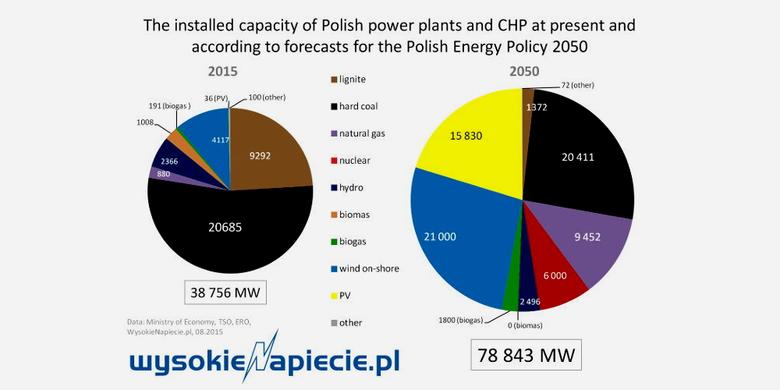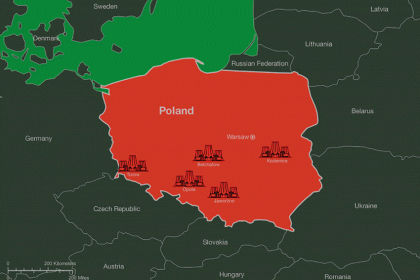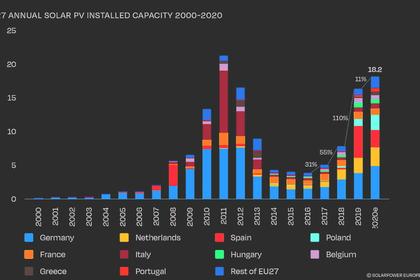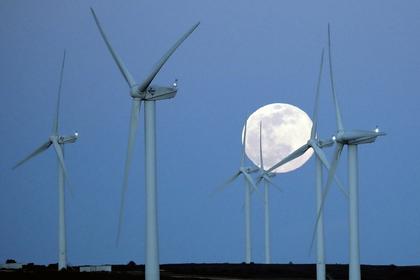
THE NEW POLAND ENERGY POLICY

N - 4 February 2021 - Poland’s cabinet on 2 February adopted "Poland's energy policy until 2040", 12 years after the previous one.
Following adoption of the energy plan, Minister of Climate and Environment Michal Kurtyka said: “We are facing the challenge of building a new energy system in the next two decades. On the one hand, it is giving dynamics to the drive towards low- and zero-emission transformation of the Polish economy, but also the necessity to ensure energy security.”
Poland currently produces most of its electricity from coal and is the only EU member state that has not joined the commitment to achieve climate neutrality by 2050, arguing that it needs more time and money for the transition to cleaner energy sources.
The new policy calls for Poland to obtain 23% of its energy from renewable sources by 2030, compared with 13% at present in line with the PEP2040 plan. This foresees an increase in wind energy, especially from farms in the Baltic Sea, and the opening of Poland’s first nuclear power plant in 2033.
No location or technology has yet been chosen for the first nuclear plant, although Polish Climate and Environment Minister Michal Kurtyka met with representatives of EDF on 2 February, including its CEO Jean-Bernard Levy, during a French trade mission to Warsaw.
Kurtyka said on Twitter: “PEP2040 will be our compass in the transition to a zero-carbon economy.”
Poland’s state-run energy group, PGE, welcomed the strategy. CEO Wojciech Dabrowski said: “This is a document expected by the entire energy sector. Just transition, a zero-emission energy system and good air quality are the pillars of PEP2040. They are also important elements of the PGE Group’s strategy.”
However, environmental groups were critical. “It seems that Minister Kurtyka – although he is responsible for the ministry of climate – has forgotten about the droughts, floods or hurricane winds that affect us more and more often due to climate change,” said Joanna Flisowska, head of climate and energy at Greenpeace Polska. “The project is also detached from the realities of European politics,” she added.
Earlier in 2020, Kurtyka had revealed plans to construct up to six nuclear power units to support the transition towards a cleaner economy. The plan includes reducing the share of coal in electricity production from 75% to between 37% and 56% by 2030, and to between 11% and 28% in 2040. He said Poland would invest PLN150 billion ($40bn) in nuclear energy, with the first reactor coming on line in 2033.
Although construction of a nuclear plant at Zarnowiec was begun in the early 1980s, it was abandoned in 1990. Kurtyka also confirmed that Poland has held talks with the Japanese Atomic Energy Agency on building a high-temperature gas-cooled research reactor. “We see this technology to be extremely promising and we would like a research reactor to be built in Poland through international cooperation and we also see a high temperature reactor as part of the solution to hydrogen production,” he said.
The first sign of a shift in Poland’s policy came in November 2019 when the climate ministry was set up headed by Kurtyka, a technocrat, and former president of the United Nation’s COP24 climate talks. In May 2020, Polish utility companies, Enea and Energa, said they were ending their involvement in the construction of a new coal-fired power plant after PKN Orlen – Energa’s main shareholder – refused to be part of the project.
In January, the Organisation for Economic Co-operation and Development’s (OECD) Nuclear Energy Agency launched an initiative together with the Ministry of Climate and Environment and the International Framework for Nuclear Energy Cooperation (IFNEC) to collaborate on issues related to innovative nuclear financing.
The initiative kicked off with a technical workshop on financing of nuclear new build. Adam Guibourgé-Czetwertynski, undersecretary of state for climate and environment, said Poland had concluded that nuclear energy has a “crucial role” in providing baseload power in the energy system. However, he acknowledged that finance was a problem.
The PEP2040 project was subject to public consultations as part of the strategic environmental impact assessment. Inter-ministerial consultations were completed on 31 December after which the PEP2040 project was positively assessed by the Coordination Committee for Development Policy. It also received a positive assessment of compliance with the Poland's medium-term Strategy for Responsible Development, issued by the Minister of Finance, Funds and Regional Policy. The PEP2040 project received a positive opinion from the Centre for Strategic Analysis at the Chancellery of the Prime Minister.
The full text of PEP2040 will be published together with the resolution of the Council of Ministers in the Official Journal of the Republic of Poland "Monitor Polski".
-----
Earlier:















